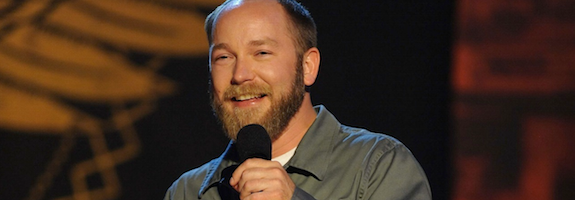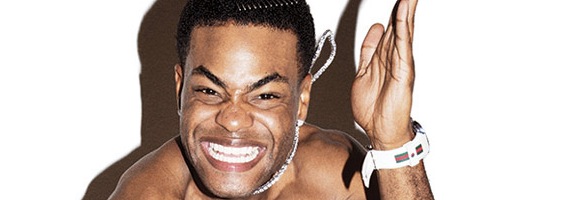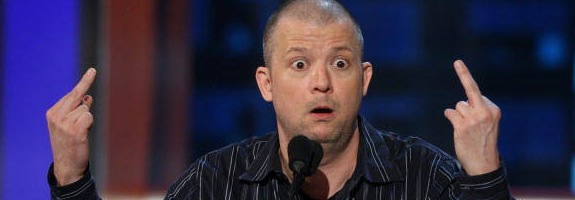Comedian Kyle Kinane is one of the smartest and most respected comedians working today – he also happens to be one of my personal favorites and a guy I’ve worked with in the past who deserves every bit of success he’s had in the past few years.
On a recent episode of The Comedian’s Comedian podcast, he was interviewed by Stuart Goldsmith in what was one of the best discussions about the art of comedy that I’ve heard on any podcast anywhere. I recommend listening to the full episode here, but you can also read some of the highlights of what Kinane had to say below.
1. Comedy Isn’t Easy And Your Comedy Shouldn’t Be For Everybody
At around the 5-minute mark, Kinane shares his take on the current comedy boom and points out that open mics are filled with people trying all kinds of bizarre stuff, wrongly assuming that somehow standup is easy to do.
“There’s more people now than ever in comedy,” he says. “I think people falsely think it’s an easy outlet.”
He goes on to explain why even from when he initially started at open mics, he’s always liked the idea of hearing some groans from people watching his act.
“It shouldn’t be for everybody,” he says. “If it’s for everybody, it can’t really be that great. If everybody likes it, I don’t think they love it.”
2. You Can Wait Until The World Asks You For Something
At around the 14-minute mark, Kinane explains how he’s approached advancing his career and it’s a strategy that flies in the face of what most comedians practice (and what most of the content on this site is, to be perfectly honest).
Basically, he’s chosen not to do anything until people come to him and ask him to do so.
“I never had the self-confidence to be like, ‘Yeah, I got this,'” he says. “I feel like if the world wants you to put it out there, they’ll ask you for it. I never released an album until a label asked me to do it. It’s a much longer way, but at least if I get down that path this way – I know I was asked to be here. I did it the way I wanted to and was asked to go to the next level.”
Kinane admits that his approach is certainly not the only way to succeed and breaks down what he sees as the different ways that comics get ahead in the business.
“There’s people with talent, there’s people with hustle, and there’s people with a mix of both,” he says. “The shorter way [to succeed] is with hustle…but if you don’t have the material to back it up when you get there, you fucked yourself.”
He adds that when he was getting started he didn’t worry about hassling bookers to put him on “good” shows and was content to perform on other shows until the people with the good shows saw him and invited him to do theirs.
“If you’re asking me to do your show, you’re approving of what I’m doing already,” he says.
3. Your Comedy Should Evolve With Your Life
At around the 31-minute mark, Kinane talks about how his comedy has changed as he’s become increasingly successful. He says his biggest goal at the moment is to write “positive comedy,” because it’s more a reflection of his satisfaction with how his career and life have evolved in recent years – and it also helps him stand out from the crowd.
“I realize I’ve got to separate myself from this pack of sad, bearded white dude comedy,” he says. “I’m trying to make it something that’s more. Something that’s not just jokes. I’m a happy person and it’s disingenuous to go up there [and pretend I’m not].”
Whether positive or not, he stresses the importance of comedians evolving in their act. “I get upset when comedians don’t grow from one thing to the next,” he says.
4. Do More Than Just Make Audiences Laugh
At around the 40-minute mark, Kinane explains how he ultimately found his voice (read more on how to find your voice here) after a string of bad shows at a festival several years ago. Feeling he had blown his big opportunity, he returned to Los Angeles and wound up discovering a new approach to his material.
“I realized…I could do some real weird shit that I think is funny to me, but sounds sad to other people,” he says. “I realized how much more powerful it was for people to understand something as opposed to just laughing at the wording. Laughing at it because you relate is so much different.”
5. Love It Enough To Do It For Free – Forever
At around the 49-minute mark, Kinane talks about how he’s proud of everything he does as a comedian and adds that setting that standard is also a way of “guarding my own happiness.”
He admits to reading comments about himself from critics and other Internet commenters, but manages to not let them affect him too much.
“I read the criticism, but if I don’t think they’re right than I don’t worry about it,” he says.
And finally, he shares some words of wisdom for other comics that are just starting out and hoping to build a successful comedy career.
“Love it enough that you’ll do it for free forever,” he says. “You’re not going to make a living.”
READ THIS NEXT: 5 Things You Can Learn From Jim Norton









